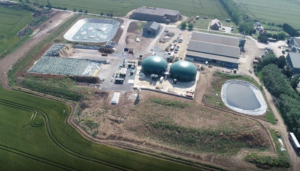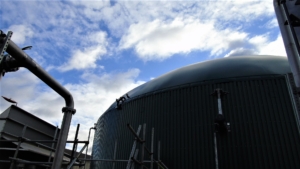Sheppey AD plant transformed in eight weeks
Transforming an underperforming anaerobic digestion (AD) plant and increasing production by 30% within eight weeks is all down to experience, according to Eco Verde Energy’s (EVE) Operations Director, Chris Brown.
Lying just off the Kent coast, The Isle of Sheppey is a 36 square-mile island renowned for seaside holidays, blue-flag beaches, fossils and nature reserves. The Sheppey Energy Limited anaerobic digestion (AD) plant was completed on the island in late 2019, boosting the island’s capacity for green energy production.
The plant generates 37,843MWh via combined heat and power (CHP) and 450 cubic metres of biomethane per hour from energy crops and plant waste. The plant offers a circular energy solution, powering more than 3,000 homes in the community using crops from an adjacent farm and waste sourced from fruit growers, and businesses in the local area. Digestate is also supplied back to the farm to be used as a nutritionally dense fertiliser for feedstock crops.
Eco Verde Energy (EVE), a specialist AD O&M (operations and management) green services provider, onboarded the Sheppey plant to optimise its output potential and profitability.
EVE delivers success by following a phased approach to onboard plants, allowing the team to observe key areas where time and resources are needed to achieve a plant’s full potential.
“A holistic approach allows us to gain a bird’s-eye view of plant operation,” explains Chris Brown, Operations Director (South) at EVE. “From here, we can identify key areas of optimisation that will benefit the client in terms of where we need to focus our time and resources. These can include compliance areas, such as safety and maintenance frameworks, right up to production,” he adds.
People are the driving force of change
A strong team is critical to the success of any business, so one of the first tasks for EVE is to ensure employees at their sites have a unified sense of direction, stability and purpose to achieve a common goal.
While change can be unsettling for staff, the process is easier when the company coming on board has years of experience within the sector and all stakeholders involved have shared objectives. This gives a solid base to address wider operational factors, explains Mr Brown.
“Getting the staff on the ground to work as a cohesive team and identifying areas for training is crucial to help bring everyone together on the improvement journey. It also gives existing employees a renewed sense of security within their role,” he says.
“Once we’ve brought the team up to speed with new processes, we can turn attention to addressing other areas of the businesses such as quality control, equipment maintenance schedules or feedstock consistency,” adds Mr Brown.
EVE’s extensive specialist knowledge and expertise means they are able to conduct a gap analysis: an on-site fact-finding mission to help identify and resolve issues to improve compliance and efficiency levels.
At the Sheppey facility, the team found difficulty with the oxygen dosing system, a process that injects pure oxygen into the digestor to combat the build-up of hydrogen sulfide (H2S). The system did not have the correct maintenance programme in place and was injecting nitrogen into the digestor, causing the gas to be out of specification and tripping the gas-to-grid unit. After discovering the root cause of this issue, which was limiting production at the facility, the team implemented a planned maintenance schedule, allocating specialist contractors to conduct work, and confirmed key revenue-generating activity with gas-to-grid and CHP agreements.
Optimising feedstock to support plant output
Maintaining a consistent supply of feedstock is another hurdle to AD plants achieving maximum output, Mr Brown explains.
“Forward planning is a crucial aspect of keeping a plant running at the optimum output. Without a quality management system in place to control the incoming feedstock, the plant will use more of the crop than expected to maintain productivity.”
The team has conducted research into feedstocks to identify the best combination, with a focus on quality and reliability of supply.
“Understanding the mass balance of a plant and the potential of what the plant can actually deliver and process in terms of feedstocks is critical. A lack of planning can cause fluctuations in output, so at Sheppey, we’ve put a new management system in place to ensure that the plant will receive a regular supply of high-quality feedstocks on time,” he says.
As a result of implementing these initial changes, overall production at the site has increased by 30%, but according to Mr Brown, creating a successful AD plant takes more than fixing singular issues.
“You can’t look at a plant in isolation to assess its performance, there’s a multitude of factors that contribute to an efficient, safe and profitable plant. It’s not just about production and output, it’s also about compliance, health and safety and building a supportive team environment,” he explains.
“We’ve standardised our audit processes, which has enabled us to set our internal benchmarks towards achieving a compliance target of 90% for health and safety, so it’s fantastic to see that the plant is reaching the high standards we strive for,” adds Mr Brown
The team is looking to the future at Sheppey and is optimising the plant, putting measures in place to secure the site’s long-term viability. They are exploring plans to install equipment that will clean the biogas, by removing the carbon dioxide, which can be captured and sold for industrial and manufacturing processes, improving the profitability and diversifying income streams for the plant.
Mr Brown is clear that he considers the experience of the EVE team as being critical to the success of turning plants such as Sheppey to high levels of compliance and output.
“In my opinion, it’s the people and the culture that enable us to deliver results. By nurturing a strong team, we’re able to troubleshoot problematic AD plants effectively and achieve maximum output for our clients while maintaining sustainability,” he says.





